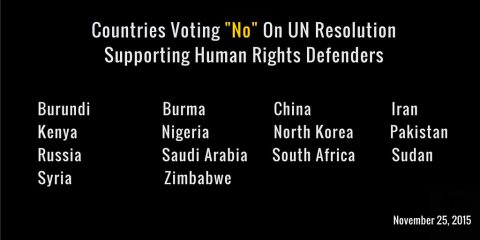On important elements of UN resolution on human rights defenders
The revised draft resolution “Recognizing the role of human rights defenders and the need for their protection,” which was put on a vote at the General Assembly on November 25, has been finally published on the UN website.
The adopted resolution makes clear that states cannot criminalise, stigmatise, impede, obstruct, or restrict the work of human rights defenders. It affirmed that States cannot adopt legislation discriminating human rights defenders in their right to associate and receive foreign support for their work.
The United States, in its comments after the vote, highlighted the importance of the resolution’s reference to protections for family members and legal representatives of human rights defenders, who are increasingly under pressure in repressive states.
The imprisonment of human rights defenders is another worrying development witnessed in many countries, such as in Azerbaijan. For the first time, the General Assembly called for the release of all such detained human rights defenders.
In another unprecedented but very welcome move, the General Assembly denounced the intimidation of human rights defenders on social media.
The unity of the international community on the issue of protecting human rights defenders has been preserved since December 1998, when the UN General Assembly adopted the Declaration on Human Rights Defenders. On November 25 in New York, China and Russia broke this unity, saying that human rights defenders have to work within the framework of national legislation and demanding a vote on the resolution submitted by Norway. It is unprecedented in the UN system for States to force a vote on a resolution on human rights defenders.
The resolution was adopted with 117 votes in favor, 14 against, and 40 abstaining. This reflects the increasingly repressive atmosphere for human rights defenders in the countries that voted against the resolution, as well as the international community’s opposition to these worrying conditions.
Source: humanrightshouse.org




















